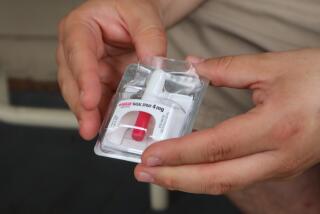California considers declaring Tylenol’s key ingredient a carcinogen

- Share via
SACRAMENTO — A fight is coming to California over whether to list one of the world’s most common over-the-counter drugs as a carcinogen, echoing recent high-profile battles over such substances as alcohol and coffee.
The drug is acetaminophen, known outside the United States as paracetamol and used to treat pain and fevers. It is the basis for more than 600 prescription and over-the-counter medications for adults and children, found in brands including Tylenol, Excedrin, Sudafed, Robitussin and Theraflu.
Acetaminophen has been available in the U.S. without a prescription since 1955. Concern about its potential link to cancer comes from its relationship to another drug: phenacetin. That drug, once a common treatment for headaches and other ailments, was banned by the U.S. Food and Drug Administration in 1983 because it caused cancer.
California regulators have reviewed 133 studies about acetaminophen, all of which were published in peer-reviewed journals. Some studies reported an increased risk of some types of cancers, while others did not. Overall, the review noted acetaminophen has been difficult to examine because it is hard to isolate from other variables that could contribute to cancer, such as smoking.
A state law known as Proposition 65 says California must warn people of any chemical known to cause cancer or reproductive toxicity. The state’s list has grown to about 900 chemicals, including toxic pesticides and flame retardants, and is more extensive than any other such list in the United States. Some say California regulators have been overzealous, requiring warning labels for countless products that confuse instead of inform consumers when the risk of cancer is disputed.
Supporters of Prop. 65 say the law protects not only Californians but also consumers nationwide by compelling manufacturers to make products safer.
Evidence for acetaminophen’s link to cancer has been weak enough that the International Agency for Research on Cancer declined to list it as a possible carcinogen after reviews in 1990 and 1999. The U.S. FDA has told state officials that labeling acetaminophen as cancer-causing would be “false and misleading” and also illegal under federal law.
A panel of scientists appointed by the governor can add chemicals to this list. In 2011, the panel voted to make acetaminophen a “high priority” for consideration because it believed there was relevant evidence to consider, according to Sam Delson, spokesman for the California Office of Environmental Health Hazard Assessment.
The review process has been slow, but the panel is scheduled to have a public hearing on the listing this spring after the public comment period closes Jan. 27.
“It’s a difficult issue because it’s a very commonly used drug. But that doesn’t make any difference. That’s not what our mandate is,” said Thomas Mack, chairman of the Carcinogen Identification Committee and a professor of preventive medicine at USC.
Adding a chemical to the list can have broad repercussions. After California listed glyphosate — widely known from the weed killer Roundup — as a carcinogen in 2017, a jury ordered the company that makes Roundup to pay more than $2 billion to a California couple with cancer. A judge later reduced that award to $87 million. An estimated 13,000 lawsuits involving the chemical are pending.
That’s one reason the industry is pushing back on a potential listing for acetaminophen. The Consumer Healthcare Products Assn., a trade group representing over-the-counter medicines and dietary supplements, conducted its own review and found that most studies suggest no risk for most forms of cancer, although some studies did show increased risk for kidney, liver and some forms of blood cancer.
The association urged California regulators to have a “cautious interpretation” of studies that show an increased risk of cancer.
Some listings in California require warning labels. But the state has made exceptions. Alcohol has been listed as a carcinogen since 1988. But instead of warning labels, the state directs the alcohol industry to provide signs to California retailers to post where alcohol is sold.
Acrylamide, a byproduct of roasting coffee beans, has been listed as a carcinogen since 1990. But when a court ruling would have resulted in warning labels for coffee, state regulators stepped in and exempted the drink.
More to Read
Inside the business of entertainment
The Wide Shot brings you news, analysis and insights on everything from streaming wars to production — and what it all means for the future.
You may occasionally receive promotional content from the Los Angeles Times.










